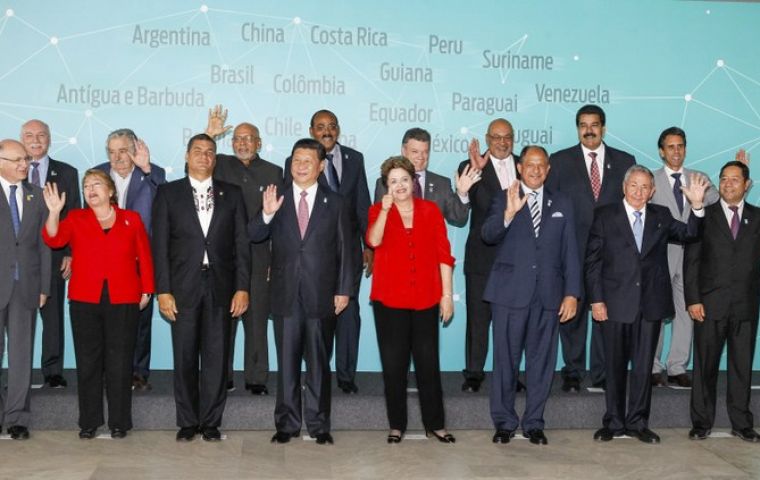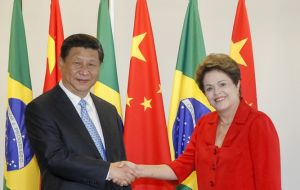MercoPress. South Atlantic News Agency
China offers 35bn fund to finance infrastructure projects in Latin America
 Xi met with 11 Latin American and Caribbean leaders at the end of a three-day visit to Brazil before heading to Argentina
Xi met with 11 Latin American and Caribbean leaders at the end of a three-day visit to Brazil before heading to Argentina  Xi and Rousseff oversaw the signing of several accords including the purchase of 60 Brazilian Embraer E190 passenger airplanes
Xi and Rousseff oversaw the signing of several accords including the purchase of 60 Brazilian Embraer E190 passenger airplanes Chinese President Xi Jinping proposed Thursday to create a 20 billion dollars fund to finance infrastructure projects in Latin America and the Caribbean.
The fund, which is expected to total 35bn was announced at the end of a summit hosted by Brazilian President Dilma Rousseff that marked the launch of the China-Latin America-Caribbean Forum.
“They proposed to do it immediately so that it can be ready next year. This money is an exclusively Chinese proposal,” Rousseff told reporters in Brasilia, adding that the fund would have initial capital of 10 billion.
Xi also offered to extend a credit line of up to 10 billion to nations of the Community of Latin American and Caribbean States (CELAC) via the Bank of China.
In addition, a Chinese-Latin American cooperation fund of 5 billion would be launched for investments in areas that have yet to be decided.
Venezuelan President Nicolas Maduro said foreign ministers of the new forum would meet in China next year to determine the mechanism to access the infrastructure fund.
Xi met with 11 Latin American and Caribbean leaders at the end of a three-day visit to Brazil before heading to Argentina, Venezuela and Cuba.
Cuba's President Raul Castro attended the talks, along with Chile's Michelle Bachelet, Colombia's Juan Manuel Santos and Ecuador's Rafael Correa.
Earlier in the visit, Rousseff and Xi oversaw the signing of several agreements between the two emerging powers. Chinese companies agreed to buy 60 Brazilian Embraer E190 passenger airplanes worth a total of 3.2 billion.
The two countries also reached agreements to cooperate in railway projects and shipping that could facilitate Brazilian exports to resource-hungry China. The Asian giant's import-export bank will loan 5 billion over three years to Brazilian mining powerhouse Vale so that the company, which ships iron ore to China, can buy or rent vessels.
The two nations signed a cooperation agreement for railway projects, with Brazil hoping China will help build tracks linking the Atlantic coast to Peru's Pacific coast.
Xi and Rousseff, whose nations marked 40 years of diplomatic relations, also launched the Portuguese-language version of China's Baidu Internet search engine.
“Our relations, which represent a truly strategic partnership, are developing at an unprecedented speed in diverse areas of cooperation,” Rousseff said.
Xi said China aims to “strengthen our strategy to create an even more prosperous future for our nations.”
Xi arrived in Brazil this week for a summit of the BRICS group of emerging powers -- Brazil, Russia, India, China and South Africa -- and South American presidents. The visit is Xi's second to Latin America since taking office last year, when he toured Mexico, Costa Rica and Trinidad and Tobago.
With the visit, Xi is presenting China as an alternative to the United States in the region, analysts say. “China is an option that matches with the leftist political sympathy that it has with some countries in the region,” said Rubens Figueiredo, foreign relations professor at Sao Paulo University.
China's massive purchases of commodities and exports of manufactured goods to the region have boosted its two-way trade with Latin America to a total of 261.6 billion last year, according to official figures. After Brazil, Xi will head to Argentina, a key source of soybeans for China, before visiting oil-supplier Venezuela and communist ally Cuba.
Despite China's growing investments in the region, it will be hard for Beijing to dislodge the United States in Latin America, said Yun Sun, East Asia expert at the Washington-based Stimson Center think-tank.
“US-Latin America long-standing, traditional ties will not be easily affected by the Chinese political and economic engagements, which are more recent and less comprehensive than US-Latin American relations,” she said.




Top Comments
Disclaimer & comment rules-

-

-

Read all commentsThis should expedite strip mining South America.
Jul 18th, 2014 - 11:18 am 0I thought Dilma was shit scared of internet spying and now she is welcoming a Portuguese-language version of China's Baidu ISE!
Jul 18th, 2014 - 11:20 am 0Doesn't anybody in SA understand even the basics of internet spying?
All this money and TMBOA broke, apart from her own multi-million dollar private accounts of course.
The Marxists finally have a true Shining Path to follow.
Jul 18th, 2014 - 03:25 pm 0Commenting for this story is now closed.
If you have a Facebook account, become a fan and comment on our Facebook Page!